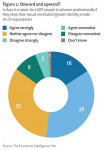Credit crisis causes reappraisal of firm-wide risk management
The report is based on an Economist Intelligence Unit survey of 316 senior executives from around the world. Among the respondents questioned for the study, 59% say the credit crisis has forced them to scrutinise their risk management practices in greater detail. Yet despite a growing appetite for ERM, many companies are still in the early stages of implementation, with only 18% of those surveyed saying they have an ERM strategy in place that is well-formulated and rolled out across the business. A key challenge for many financial services companies is that the move to an enterprise-wide risk management approach is lengthy and often involves a shift in corporate culture.
Executives surveyed for the report also identified a lack of relevant, timely and consistent data as one of the factors preventing a wider uptake of ERM. One difficulty faced by large, financial institutions in particular is that information has often been gathered and stored as a result of mergers and acquisitions, resulting in definitions and measures that are often inconsistent.
"This survey confirms that financial services organisations will increasingly be looking to adopt best practice in risk management, with firm-wide risk and stress testing being placed centre stage," said Allan Russell, head of global risk practice at SAS.
Other key findings of the report include:
• An expectation of growing regulatory pressure will increase the implementation of ERM. In the wake of recent recommendations from regulators and industry groups, rating agencies are likely to step up the pressure on firms to adopt best practice in risk management systems. Of those polled for this report, 72% say regulators are exerting pressure on their firms to implement or refine an ERM strategy.
• Executives in financial services firms lack confidence in their risk management tools and in stress testing methods in particular. While 59% of respondents say they will be increasing the amount of time they invest in their stress-testing practices in the coming 12 months, just 27% say they have confidence in current methods. In some cases, it is a lack of uniform data across the business lines that hampers the process; in others it is a complex geographical spread. Often business units in isolation, rather than across all business operations, measure the effect of particular stresses.
• Protection against loss and damage is the most important potential benefit of an ERM strategy. For those financial executives who embrace an enterprise-wide approach to risk, the benefits can be plentiful. As well as protection against loss and damage, executives also cite more efficient allocation of capital as a clear benefit of an enterprise-wide risk approach, while a reduction in losses is seen as another advantage.
• Embedding risk management into the company culture is one of the toughest challenges when implementing an ERM strategy. Nearly half of all respondents surveyed say that creating a culture for risk management is a challenge. Difficulties that need to be addressed include reluctance to change, or reluctance among organisations to assume the responsibilities of risk management. New organisational structures can play a key role in developing this culture.
About the report
The bigger picture: Enterprise risk management in financial services organisations is an Economist Intelligence Unit report, commissioned by SAS. The Economist Intelligence Unit’s editorial team conducted the survey on which the analysis is based and wrote the report. The survey consisted of 316 senior executives from around the world, all of whom have a primary focus on risk management. The survey included companies of varying sizes from the financial services industry.
About the Economist Intelligence Unit
The Economist Intelligence Unit is the world leader in global business intelligence. It is the business–to–business arm of The Economist Group, which publishes The Economist newspaper. The Economist Intelligence Unit provides geopolitical, economic and business analysis on more than 200 countries, as well as strategic intelligence on key industries and management practices. With over 300 full–time professionals in 40 offices around the world, supported by a global network of more than 700 contributing analysts, the Economist Intelligence Unit is widely known for its unparalleled coverage of major and emerging markets. More information about the Economist Intelligence Unit can be found at www.eiu.com.
웹사이트: http://www.eiu.com
연락처
Joanne McKenna
Press Liaison
Economist Intelligence Unit
26 Red Lion Square
London
WC1R 4HQ
UK
Direct: +44 (0) 20 7576 8188
Sales: +44 (0) 20 7576 8181
Switchboard: +44 (0) 20 7576 8000
email: 이메일 보내기
이 보도자료는 Economist Intelligence Unit가(이) 작성해 뉴스와이어 서비스를 통해 배포한 뉴스입니다. 뉴스와이어는 편집 가이드라인을 준수합니다.




